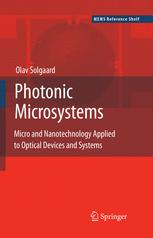

Most ebook files are in PDF format, so you can easily read them using various software such as Foxit Reader or directly on the Google Chrome browser.
Some ebook files are released by publishers in other formats such as .awz, .mobi, .epub, .fb2, etc. You may need to install specific software to read these formats on mobile/PC, such as Calibre.
Please read the tutorial at this link: https://ebookbell.com/faq
We offer FREE conversion to the popular formats you request; however, this may take some time. Therefore, right after payment, please email us, and we will try to provide the service as quickly as possible.
For some exceptional file formats or broken links (if any), please refrain from opening any disputes. Instead, email us first, and we will try to assist within a maximum of 6 hours.
EbookBell Team

4.3
48 reviewsPhotonic Microsystems: Micro and Nanotechnology Applied to Optical Devices and Systems
Photonic Microsystems also describes the phenomenon of Photonic crystals (nanophotonics) and demonstrates their ability to enable synthesis of materials with optimized optical characteristics. This provides control over optical fields over sub-wavelength distances, leading to devices with improved scaling and functionality compared to traditional optics.
Photonic Microsystems: Micro and Nanotechnology Applied to Optical Devices and Systems concludes with an up-to-date discussion of the need for the combination of MEMS and Photonic crystals by demonstrating that practical photonic-crystal devices leverage MEMS technology for integration and packaging.
Drawing upon years of practical experience and using numerous examples and illustrative applications Olav Solgaard discusses:
How Practical photonic-crystal devices leverage MEMS technology for integration and packaging
The role of miniaturization in the integration and packaging of photonic microsystems
The fundamental limits on scaling of optical devices and systems
The analytical descriptions of Photonic Crystals and the practical application of Photonic-Crystal technology
Teaches the fundamentals of optics and makes micro and nano photonics accessible to non experts
About The MEMs Reference Shelf:
"The MEMs Reference Shelf is a series devoted to Micro-Electro-Mechanical Systems (MEMs) which combine mechanical, electrical, optical, or fluidic elements on a common microfabricated substrate to create sensors, actuators, and microsystems. The series, authored by leading MEMs practitioners, strives to provide a framework where basic principles, known methodologies and new applications are integrated in a coherent and consistent manner."
STEPHEN D. SENTURIA
Massachusetts Institute of Technology, Professor of Electrical Engineering, Emeritus